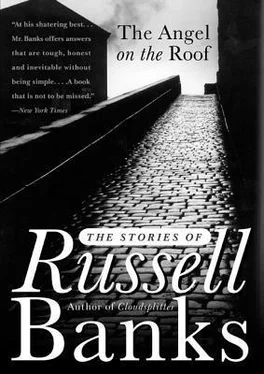The fire in the stove crackled softly, the kitchen was close and warm, dimly lit by kerosene lanterns that filled the room with a fluid, golden light darting and disintegrating into flat planes of light and shadow, as my father, huge in the low-ceilinged room, moved from window to door to woodbox to black cookstove and back to the window again, talking throughout in a low, rumbling voice of his work, how it had gone this week, the men he worked with and for: his inestimable value to the larger world. The air was filled with the odors of hardwood chunks slowly burning and food, Friday night supper, fish, though we were not Catholic.
“I bet it hits zero tonight,” my father announced.
My mother observed that at least there’d been no snow yet. She stubbed out her cigarette in the wet saucer.
“I haven’t had my skates on in years,” he said. “They’re still up in the attic, aren’t they? I remember hanging them on a nail up there two summers ago, when we unpacked.”
“No one’s touched them, so they must be where you put them,” she said.
He left the kitchen and in a few seconds could be heard clumping around overhead in the attic, looking for his skates.
In the morning, after breakfast, my father said to me, “C’mere, we’re going to get you some ice skates and teach you how to use ’em.” And with his, to me, enormous, blocky, leather-and-steel skates tied together by their thick laces and slung over his shoulder, he headed out the door to the barn to start the car.
Recalling her own freezing discomfort from some night years ago, the abject misery of the nonskater who must stand at the edge of the ice stamping heavy, numbed feet or else must skid in small, choppy circles on rubber soles, waiting like a cripple while the others glide gracefully past in long arcs that sweep them into the darkness at the far side of the pond, my mother tried to buffer me against the force of her remembered misery by wrapping me in heavy layers of wool and rubber clothing, until I stood in the kitchen stiff and immobile as a chair, red-faced and sweating. My father had backed the car out of the barn, idling, then racing the motor. He rapped impatiently on the horn. My mother swung the door open for me, and I entered the cold morning air, moving like a penguin.
The air was crystalline, almost absent. The fields lay like aged plates of bone — dry, scoured by the cold until barren of possibility, incapable even of decomposition. Clumps of trees, mostly pine and spruce in roadside woodlots, stood in the windless cold like bears crossly aching to sleep.
When we got to Maxfield’s store in Pittsfield, my father peeled off several layers of the clothing my mother had laced onto me at the house, and I was able to move my arms somewhat and bend my legs at the knees. My new skates were beautiful. Just like my father’s, but about one-quarter scale. They were stiff outside, as if carved from blocks of wood, yet when laced onto my feet they felt like a gentle pair of hands. Brown and black, hockey-style skates, the shoe was cut fairly low, except for the tendon guard at the back, and the blades, the lovely steel strands that were going to lift me off the ice and free me from the yank of gravity, were toughly snubbed at the toe and heel. And sharp.
“Hollow-ground,” the salesman assured my father, who tied the two skates together by their thick, yellow laces and draped them over my shoulder. I felt the sudden, surprising, downward tug of their weight.
Returning to the car, we got in and drove the half mile or so to the east end of town, to White’s Pond, a small, shallow, man-made pond used in summer months as the municipal swimming pool, in winter as a public skating rink. A log touching the shore, frozen where it had floated months ago, was the obvious place to sit and exchange shoes for skates. A dozen pairs of various-sized and — shaped shoes lay in the vicinity of the log, and out on the ice a couple of men and a crowd of boys were slapping a puck erratically back and forth in furious, structureless sport. It was early, and they had been on the ice only a short time and were merely testing themselves, each other, and their equipment before choosing sides for a game.
My father pulled my shoes off and replaced them with the new skates and laced them up for me, asking me, when he had finished, if from now on I thought I could do it for myself, telling me that I must remember to lace them each time all the way from the toe. “And tight , as tight as you can get them. That is lesson number one,” he said seriously.
Then he put on his own skates and stepped gingerly from the bank to the ice. As if he had suddenly taken flight, he was gone.
I stood, and my weight wobbled on the short, thin lines that the blades had become, and then my ankles gave way, and I tipped and fell on the ground behind the log, wondering what had happened. I could not see my father anywhere.
Deciding that ice would make the difference and that, once on it, I, too, would fly off with incredible, weightless grace, I dragged my body like a bundle of sticks and cloth down to the log, over it, and out onto the surface of the pond. Once again, I stood. Then I waited for it to happen, for the beautiful speed to come.
But in seconds my body, seeking balance from some point in space high above the blades, overcompensated and tipped, pitching me to the ice, where I remained for some time, utterly bewildered, my ears reddening with shame. My vision was rapidly narrowing, closing in on me, and now I was afraid that I would see my father, would see him watching me with scorn in his eyes.
Again and again, I struggled with my body and lifted it to a position that roughly approximated a standing position, and before I had a chance to locate it relative to the bank and log behind me and the vast expanse of ice in front of me, it was lying facedown again, arms and legs splayed, as if thrown to the ice from a great height.
Eventually, knees and elbows aching, the base of my spine a star of pain, I was able to hold my body in a standing position for what seemed like hours. Slowly, carefully, I raised my eyes from my feet, trusting them finally not to betray me, and saw that I had traveled halfway across the pond. The shore looked like a horizon. Not twenty feet away, a crowd of large boys and larger men slashed viciously at the ice with hockey sticks. They surged back and forth, like a dogfight in water, skate blades like ravening teeth against the ice.
Then, suddenly, they were gone, racing away in raucous pursuit of the tiny, black, fleeing puck. Their legs and shoulders seemed to move only from side to side. It was as if the skaters were casually bouncing off the opposite banks of a narrow stream in the middle of a large, flat field — and yet they flowed smoothly away from me. Attempting to imitate that powerful side-to-side motion, I pushed off my right skate and toppled over like a stack of bricks.
This went on for a long time, until I discovered that I could move — slowly, clumsily, and with great pain — in a forward direction. The cold, from my having lain on the ice so often and for so long, had crept through my coat, sweater, and flannel shirt, and I was shivering. The small of my back and my neck had contracted into icy knots that were spreading quickly through the rest of my body. I ached everywhere, and my ankles felt like thick drums of gum rubber.
I headed painfully back toward the bank, sliding-single-step by sliding-single-step. I imagined that I was pushing off my skate blades from one side to the other and was cruising across the surface of the pond at an incredible speed, when suddenly my father swept out of nowhere, like a moving waterfall, sliced hugely across in front of me, careened powerfully over to my other side. Where he changed direction! Skated backwards ! And I saw then that I was plodding, step by step, at about one-eighth my normal walking rate.
Читать дальше












